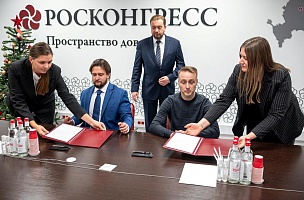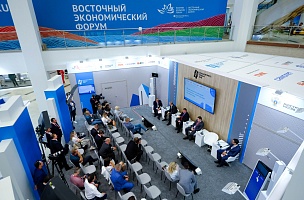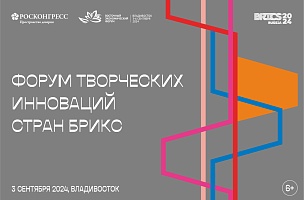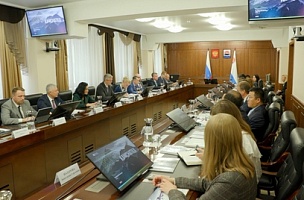The pavilion of Russia’s Jewish
Autonomous Region will present key industry and investment projects, prospects
for international business cooperation, and plans for infrastructure
development to guests at the ‘Far East Street’ exhibition, which will be held
as part of the Eastern Economic Forum 2024 in Vladivostok. The exposition will
focus on the 90th anniversary of the Jewish Autonomous Region. The
Roscongress Foundation is organizing the exhibition with the support of the
Office of the Plenipotentiary Presidential Envoy to the Far Eastern Federal
District.
“The ‘Far East Street’ exhibition introduces
participants and guests of the Eastern Economic Forum to the cultural features,
everyday life, traditions, economic achievements, and social development of eleven
Far Eastern regions, one of which is the Jewish Autonomous Region. The first
railway bridge between Russia and China, Tongjiang–Nizhneleninskoye, has begun
operating in the region. A major transport, logistics, and production complex
will appear here. This will provide economic incentive for the development of
the region and the entire Far East, and will create jobs for both blue-collar
workers and highly qualified specialists. Haemostatic tourniquets manufactured
at the Birobidzhan enterprise, as well as domestically produced haemostatic
agents, are regularly sent to the front lines of the special military
operation. At the last Eastern Economic Forum, the Russian president approved a
master plan for Birobidzhan. Work is currently underway on a long-term
comprehensive development plan that will directly improve people’s quality of
life. This includes the construction and reconstruction of social and transport
infrastructure, as well as housing and utility service facilities, the creation
of a comfortable urban environment, and solutions to the city’s other
infrastructure problems. Our exhibition will show how the region is developing,
what new focuses are emerging in the economy, and what makes the region
attractive,” Russian Deputy Prime Minister and Plenipotentiary Presidential
Envoy to the Far Eastern Federal District Yury Trutnev said.
Visitors to the pavilion will have
a chance to learn about the region’s unique national features, natural beauty,
and investment potential. The key component of the exposition will be a rainbow
bridge, since the rainbow is a symbol of peace, happiness, and kindness, as
well as the main element in the Jewish Autonomous Region’s flag. A robot will
serve as a tour guide and tell guests about the region’s history, traditions,
and peculiarities.
A large light panel inside the
pavilion will display information about the region’s existing industrial
enterprises, investment projects with a high level of readiness, and promising
proposals for investors. This includes the production of iron ore concentrate,
brucite mining, power generation, timber industry, graphite mining, a logistics
centre, and more. Nearby, cubes installed on a stand will let visitors examine
products made by local manufacturing enterprises: brucite, iron ore, timber
processing products, and graphite. There will be a cube with fine-grained
brucite and visitors will be able to take home a stone as a souvenir.
A small wall panel will display information about promising projects and their unique features, as well as data about the activities of numerous enterprises in the region. In particular, it will provide details about projects to form an agro-industrial park, refurbish greenhouses, build a soybean processing plant, and produce mineral fertilizers.
The touch panel will contain an
investment map and information about investment opportunities in the area of
the Tongjiang–Nizhneleninskoye bridge with an image of areas where projects are
already being implemented and sites that are still available. It will also tell
visitors about the implementation of the Birobidzhan master plan.
“At the ‘Far East Street’
exhibition, the Jewish Autonomous Region showcases the uniqueness of our
territory, its potential, achievements, and our distinctive and inimitable
Jewish culture. The pavilion’s guests will have a chance to learn more about
opportunities in the region. Along with established investment projects, it
will also present those that are just starting to be implemented. Each guest at
our platform will become acquainted with the special features of our territory
and achievements in industry, culture, and sports. The region is actively
developing with the most modern technologies. The upcoming expansion of gas
infrastructure will provide a new impetus for development: new high-tech
production facilities will open, and existing enterprises will be able to
manufacture new types of products. We have lots to be proud of and things to
show off at the Eastern Economic Forum,” Jewish Autonomous Region Governor Rostislav
Goldstein said.
A three-sided structure will be
installed in the centre of the pavilion. The first side will present tourism
opportunities in the region: the Bastak Nature Reserve, the Jewish Town brand,
a museum and memorial complex on top of Iyun-Koran hill in the village of
Volochayevka, the FOMA ski resorts, Zmeinaya Mountain, and the resort area in
the village of Kuldur. QR codes can be used to find out more detailed
information about these sites and projects. There will be a separate QR code
with information about the second ‘Far East – Land of Adventures’ All-Russian
travel competition, which is being held based on an initiative from Yury
Trutnev. The second side of the structure will focus on the production
facilities of SMEs: knitwear, clothing, and footwear. The third side will show
how Russia is phasing out imports and building its technological sovereignty,
in addition to a number of production facilities, including hydraulic cylinders
at the Regional Technical Centre, haemostatic tourniquets, 3D games, and pharmaceutical
products.
There will be a ‘living newspaper’
nearby, which consists of a structure with built-in screens and texts in the
style of a printed spread. Guests will learn about the history of the Jewish
Autonomous Region’s establishment, the region’s traditions and culture, and
further development plans.
The trade area will feature
products made by local SMEs. Guests will be able to buy honey, Pravda brand
clothes, knitwear, and souvenirs. There will be an outdoor recreation area for
visitors just opposite the pavilion.
An art object made of three brucite
rocks will also be installed at the exhibition. A lift truck from the Regional
Technical Centre that services airfields will be located next to the pavilion.
There will also be sports and cultural programmes, as well as various creative
master classes.
The Eastern Economic Forum will
take place on 3–6 September on the campus of Far Eastern Federal University in
Vladivostok. During these days, the ‘Far East Street’ exhibition will be open
to Forum participants, and on 7–8 September it will be open to everyone. The
Eastern Economic Forum is being organized by the Roscongress Foundation.






